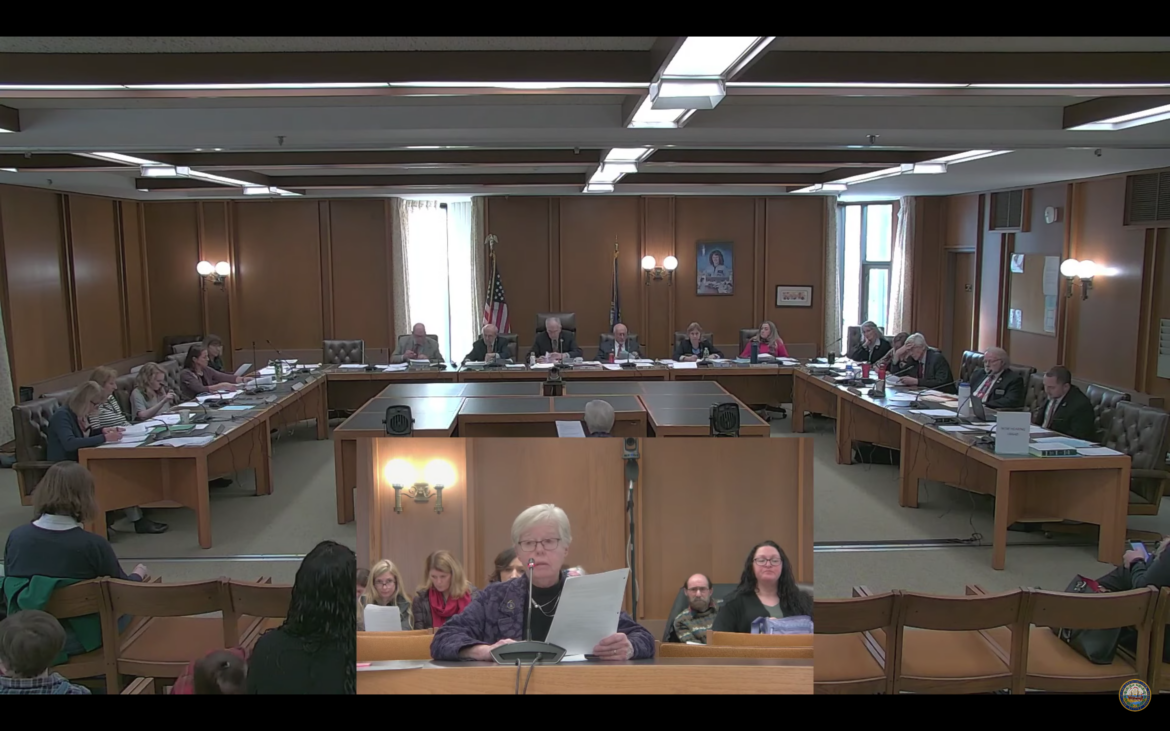By GARRY RAYNO, InDepthNH.org
CONCORD — A bill expanding criminal background checks to employees or volunteers of non-public educational services that take state money drew opposition from a number of homeschoolers Friday at a public hearing before the House Education Committee.
Bill supporters said more accountability is needed if state money is used to pay for alternative or other non-public programs to ensure children are as safe as they can be.
“One of the most important functions provided in public education,” said the bill’s prime sponsor, Rep. Linda Tanner, D-Sunapee, “is the safety of our students.”
She said there are currently some gaps in areas that accept public funding that her bill would address.
But others called the bill harassment, government overreach and punitive, with others saying it would financially cripple some non-profits who currently provide educational services to students with state money.
‘This is a slippery slope that can reach into traditional home education families,” said Michelle Levell, director of Granite State Home Educators, “(to imply) bad actors use home education to hide child abuse is an unfounded accusation.”
She said most traditional homeschoolers do not accept state funds.
House Bill 628 would require criminal background checks on educators and volunteers of all non-public schools or education service providers that accept public funds.
The requirement would apply to all approved vendors in the Education Freedom Account program, Learn Everywhere hosts, alternative education providers and any programs accepting state scholarships or tax credit grants.
One member of the committee questioned whether the money going to the non-public programs was actually state funds if it was first given to the parents who in turn decide where to spend it.
“This is not public money,” state committee vice chair Rep. Glenn Cordelli, R-Tuftonboro, “You’re imposing a requirement on a family’s natural right to raise their child.”
The bill has the support of the School Principals Association saying its priority is the safety of all students.
But the Diocese of Manchester opposed the bill saying it disagrees with the premise that money given to parents for tuition to their schools is state money.
But the diocese also believes the bill would require more from non-public education providers than public schools.
“Looking at the substantive provisions of HB 628, we believe that this bill seeks to place mandates on nonpublic schools that are both unworkable and unnecessary, and which in some respects exceed the mandates the legislature has enacted for public schools,” said Robert Dunn, Director of Office of Public Policy for the diocese.
Several committee members questioned if the bill would interfere with parents’ right to free assembly in joining homeschool cooperatives.
But Tanner said the issue is whether they take state money.
“If you accept state funds there is accountability,” Tanner said, “and part of that is to keep students — as reasonably as you can — safe from the people who work with them.”
She noted there have been instances of abuse by people who have passed the educators’ background check that schools must provide. “There is no 100 percent guarantee,” she said.
Committee member Rep. Mel Myler, D-Hopkinton, clarified the intent of the bill is not parents homeschooling their kids, but the homeschool learning centers they have heard about this session with a number of students from different homeschool programs and the people who instruct and volunteer at those centers.
Levell said homeschoolers who do not accept state funds should not be covered under the bill, but said she wondered if she should “dare leave my child with a friend for an hour to go get groceries.”
She called the bill an unfounded witch hunt, noting in New Hampshire every adult is a mandatory reporter of suspected child abuse.
“This is a gross overreach and a government intrusion,” Levell said.
Christy Whipple, the head of the Newport Montessorri School, said all her instructors and workers do undergo criminal background checks including the custodian who works three hours a day.
But she said the non-profit school depends on volunteers for such things as the winter program at Mount Sunapee or taking students back and forth from the mountain because they don’t have a bus.
“Out parent volunteers are never in charge of students, never do direct instruction and are never alone with the students,” Whipple said. “This bill is concerning for fiscal reasons. We’re a non-profit school and this would be a direct expense to the school.”
She said she belongs to a non-public school advisory committee and is not aware of any of the schools that do not do background checks.
Abigal Bellemore of Chester said she is a member of a six-family co-op homeschooling program with 25 students that meets once a week to use each other’s strength to provide the best education possible for their children.
None of the parents accept state funding, she said, but she is concerned the bill’s requirements would “bleed” into their group if one person accepts funds. “The economy is not what it was a year ago,” Bellemore said.
She said she volunteers for a number of organizations that do require a background check and is fine with that, “but I don’t find (a background check) necessary to educate my children.”
The committee did not make an immediate recommendation on the bill.
Garry Rayno may be reached at garry.rayno@yahoo.com.





